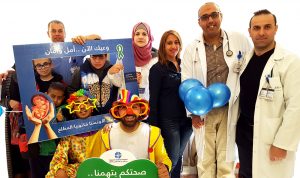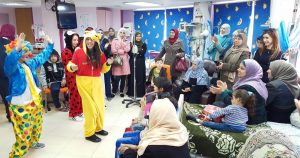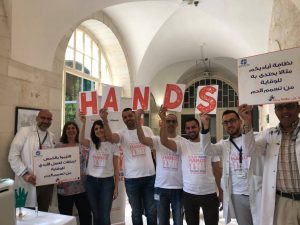“The unselfish effort to bring cheer to others will be the beginning of a happier life for ourselves.” Helen Keller

The brightly decorated hall at Notre Dame of Jerusalem Center was packed with children, around 600 of them, waiting excitedly to see the clowns and sing along with them just before Christmas of 2018. It echoed with the laughter of those children as the clowns sang and animated fun activities for an hour and a half. This entertainment event was made possible through the initiative taken by a group of young Jerusalemites who voluntarily organized a Christmas party whose proceeds went to the children who are being treated for cancer at Augusta Victoria Hospital (AVH) in Jerusalem. This is just one instance of volunteerism, altruism, benevolence, and morality that needs to come into the limelight. There are numerous other accounts of Palestinian individuals and groups giving generously to patients at AVH. The story of this kind of volunteerism, however, remains an untold story that highlights the value of giving and sharing that is deeply embedded in the Palestinian culture and social fabric.

On a daily basis, the AVH is flooded with visitors, entertainers, schoolchildren, and others who have come to give to the children at the hospital. Their only aim is to brighten the lives of these sick children by providing them with fun activities, gifts, laughter, and entertainment. They bring a smile to these children who may be going through tough times during their grueling chemotherapy treatment or dialysis. They make a difference in these children’s lives, especially if their hospital stay is long and they have to be separated from their parents for long periods of time, as is the case with the majority of children from Gaza who are accompanied by elderly women who volunteer to chaperone them during treatment at AVH. Young mothers of sick children from Gaza are forbidden by the Israeli military forces, for “security reasons,” to accompany their children during their treatment. Sometimes, an individual may order lunch packages or donate a generous amount of money to the hospital.
The untold story of giving to the sick at Augusta Victoria Hospital on the Mount of Olives in Jerusalem deserves more attention and is cause for appreciation.
This specific form of volunteerism transcends institutionalized philanthropy and becomes an informal, unstructured, and spontaneous individual act of love and commitment to humanity. Volunteers do not do it for accolades; they do it to make a difference in other people’s lives. They come to AVH to give all that is alive in them – their love, empathy, and understanding. Some people do these acts of giving out of deeply rooted religious beliefs. We all know that in the three monotheistic religions, Judaism, Christianity, and Islam, “giving” is an obligation towards humanity. Others do it for deeply rooted socio-cultural reasons. And I have no explanation for why, in many instances, the people of Hebron are among the most generous local givers.

The act is not only limited to religious obligation but rather expands to a sense of belonging and a desire to provide support to other human beings who are in need. It also fosters an underlying bond and resilience in a community that has otherwise been burdened and possibly disheartened by a prolonged occupation. In one instance, I was shocked to learn about a fundraising event, which took place at an orphanage boarding school in Jerusalem, whose proceeds went to benefit the treatment of children with cancer at AVH. An amazing amount that exceeded US$ 3,000 was raised. Orphans, who come from very poor backgrounds, felt the need to give of their meager savings to make a difference; and I believe it was to gain a sense of “inner satisfaction.”
The value of sharing and giving is deeply embedded in Palestinian society and culture.
The value of this kind of volunteering cannot be measured as much in monetary terms as in moral and ethical ones. All these activities of giving have had their impact on the sick, and particularly on children. They have had an immense therapeutic impact on the sick children by providing a supportive and empowering atmosphere. For us at AVH, we feel that all these acts of volunteerism and giving bring us closer to the higher values that we aspire to in Palestinian society, such as social justice, equality, freedom, mutual trust, and most importantly, a deeper sense of belonging.


